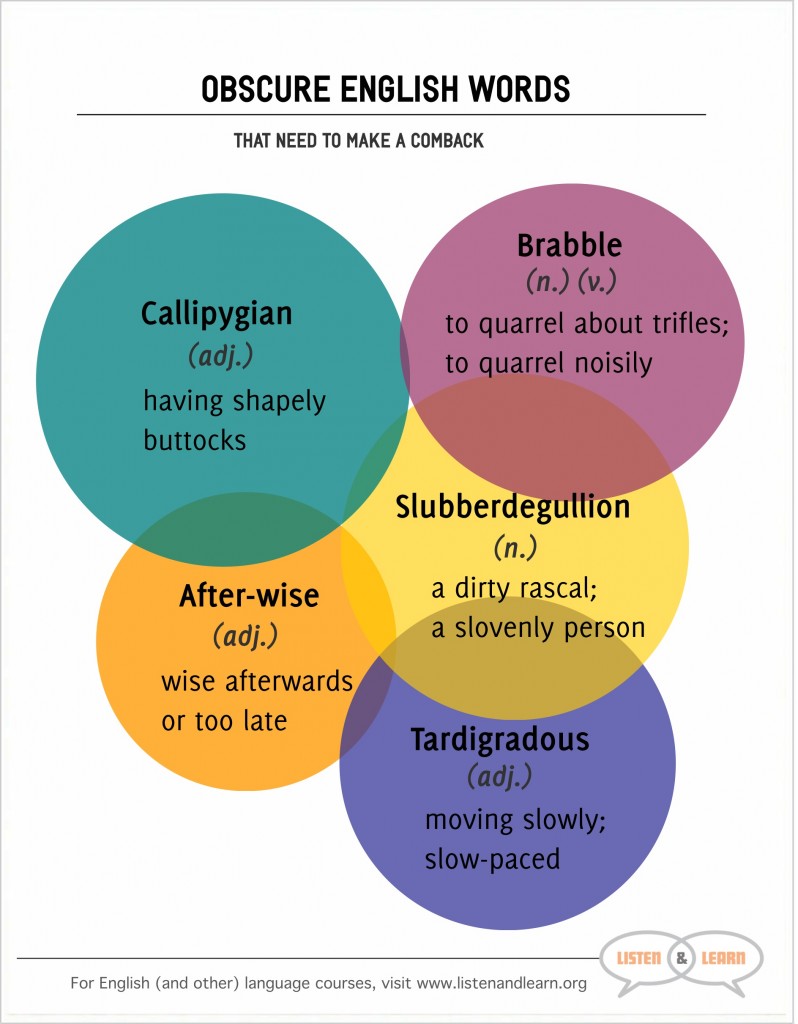Obscure English Words That Need to Make a Comeback
Table of Contents
One of the first things you learn when studying language, particularly in a socio-cultural context, is that it refuses to be static. It ebbs and flows like the tide, allowing new words to rest upon the sandy shore, and reclaiming old ones, pulling them back to the shadowy depths.
It is remarkably dynamic. It adapts and changes to the cultural landscapes it inhabits and reflects the current need for new and more fitting words. Plenty of people have voiced their opinions regarding new additions to the dictionary – some love it, some hate it – but despite expressed disdain and in some cases, remorse, the evolution of language is inevitable.
Consider this: 200 years ago, microwave wasn’t in the dictionary. Why would it have been? Before some invented the wonderful contraption that made university life a breeze, there was no need for the word. And since then, new words have continuously been added – for instance, muggle, as in ‘a person who is not conversant with a particular activity or skill’ was added to the Oxford English Dictionary in 2003.
But just as words are added, they are also abandoned. We cannot always be sure why, but we can suggest reviving them. Check out this list of obsolete words that sound so cool we might as well bring them back from the grave!
***
Callipygian (adj.)
Definition
having shapely buttocks
Origin
Greek ‘kallipygos’, from kalli- + pygē buttocks
First Known Use
circa 1800
Doesn’t it sound so...classy? Just think - what if rap, hip-hop and modern pop artists started tossing callipygian into their hit songs? That would certainly make for an interesting Top 40; although I suppose it doesn’t quite roll off the tongue like “I like big butts and I cannot lie.”
Slubberdegullion (n.)
Definition
a dirty rascal; a slovenly person
Origin
Dutch or Low German ‘overslubberen’ meaning to wade through mud, or ‘slubbern’ meaning to gobble; probably an irregular from slubber (v.) meaning to stain or sully; or to perform in a slipshod fashion
First Known Use
circa 1800 (slubber, though, originated in 1530)
Slubberdegullion. It rolls off the tongue. Just saying the word aloud brings to mind a rascally, disheveled man completely content to sit in filth.
“Joey is such a slubberdegullion! His dirty dishes are stacked a mile high, and he slubbered the living room carpet!”
Tardigradous (adj.)
Definition
moving slowly; slow-paced
Origin
Latin ‘tardus’ slow + ‘gradi’ to step, go
First Known Use
1860
Say it slowly: tar-di-gra-dous. This one is definitely a keeper, even saying it out loud requires slow-paced pronunciation.
“The tour guide’s tardigradous pace might have been relaxing for some people, but it was infuriating for me considering my growling stomach.”
After-wise (adj.)
Definition
wise afterwards or too late
Origin
Middle English ‘after’ + ‘wise’
First Known Use
This is the perfect word to describe that feeling of knowing exactly what you wish you would have said moments after the opportunity to say it has passed. It’s frustrating, my friends, I know.
“Jill always makes backhanded comments toward me, but I’m afterwise – I only ever have a reply when she’s already gone.”
Brabble (v. or n.)
Definition
to quarrel about trifles; esp. to quarrel noisily, brawl, squabble
Origin
Middle Dutch ‘brabbelen’
First Known Use
circa 1530
It sounds like exactly the type of action (or noun!) to which it refers. It essentially means to argue loudly, get into a physical skirmish and annoy each other for no apparent reason. My two siblings and I were frequent brabblers (see what I did there?) on long car rides when we were young.
You have to admit, those Middle English, Low German, Latin, Middle Dutch, and Greek speakers came up with some astoundingly fun-to-say words. They knew just how to describe actions, people, and situations that we simply don’t have words for today. So if we can add ‘mansplaining’ and ‘side-eyeing’ to the dictionary, can’t we also throw in an occasional ‘nuncupatory’ or ‘hugger-mugger’? You have to admit, it would make talking to each other a whole lot more fun!
And if we started borrowing words from old English, couldn’t we also steal a few from other languages? Check out our list of available language courses and try one out – and soon enough you’ll be codeswitching like a pro!



